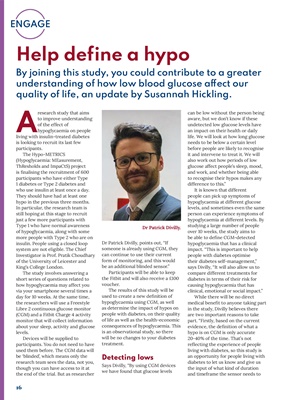
16
ENGAGE
Help define a hypo
By joining this study, you could contribute to a greater
understanding of how low blood sugars affect our
quality of life, an update by Susannah Hickling.
A
research study that aims
to improve understanding
of the effect of
hypoglycaemia on people
living with insulin-treated diabetes
is looking to recruit its last few
participants.
The Hypo-METRICS
(Hypoglycaemia: MEasurement,
ThResholds and ImpaCtS) project
is finalising the recruitment of 600
participants who have either Type
1 diabetes or Type 2 diabetes and
who use insulin at least once a day.
They should have had at least one
hypo in the previous three months.
In particular, the research team is
still hoping at this stage to recruit
just a few more participants with
Type 1 who have normal awareness
of hypoglycaemia, along with some
more people with Type 2 who are on
insulin. People using a closed loop
system are not eligible. The Chief
Investigator is Prof. Pratik Choudhary
of the University of Leicester and
King's College London.
The study involves answering a
short series of questions related to
how hypoglycaemia may affect you
via your smartphone several times a
day for 10 weeks. At the same time,
the researchers will use a Freestyle
Libre 2 continuous glucose monitor
(CGM) and a Fitbit Charge 4 activity
monitor that will collect information
about your sleep, activity and glucose
levels.
Devices will be supplied to
participants. You do not need to have
used them before. The CGM data will
be 'blinded', which means only the
research team sees the data, not you,
though you can have access to it at
the end of the trial. But as researcher
Dr Patrick Divilly, points out, "If
someone is already using CGM, they
can continue to use their current
form of monitoring, and this would
be an additional blinded sensor."
Participants will be able to keep
the Fitbit and will also receive a £100
voucher.
The results of this study will be
used to create a new definition of
hypoglycaemia using CGM, as well
as determine the impact of hypos on
people with diabetes, on their quality
of life as well as the health-economic
consequences of hypoglycaemia. This
is an observational study, so there
will be no changes to your diabetes
treatment.
Detecting lows
Says Divilly, "By using CGM devices
we have found that glucose levels
can be low without the person being
aware, but we don't know if these
undetected low glucose levels have
an impact on their health or daily
life. We will look at how long glucose
needs to be below a certain level
before people are likely to recognise
it and intervene to treat it. We will
also work out how periods of low
glucose affect people's sleep, mood,
and work, and whether being able
to recognise their hypos makes any
difference to this."
It is known that different
people can pick up symptoms of
hypoglycaemia at different glucose
levels, and sometimes even the same
person can experience symptoms of
hypoglycaemia at different levels. By
studying a large number of people
over 10 weeks, the study aims to
be able to define CGM-detected
hypoglycaemia that has a clinical
impact. "This is important to help
people with diabetes optimise
their diabetes self-management,"
says Divilly, "It will also allow us to
compare different treatments for
diabetes in terms of their risk for
causing hypoglycaemia that has
clinical, emotional or social impact."
While there will be no direct
medical benefit to anyone taking part
in the study, Divilly believes there
are two important reasons to take
part. "Firstly, based on the current
evidence, the definition of what a
hypo is on CGM is only accurate
20-40% of the time. That's not
reflecting the experience of people
living with diabetes, so this study is
an opportunity for people living with
diabetes to let us know and give us
the input of what kind of duration
and timeframe the sensor needs to
Dr Patrick Divilly.